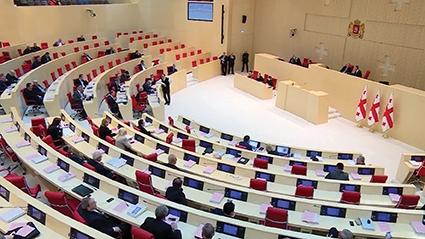In the Constitutional Majority We Trust
OPED
Constitutional Majority- this pair of words is the most overused and overcharged polit-lingual entry in today’s political vocabulary of Georgia. The talk about majority in general, and constitutional majority in particular, is presently big and bitter in the country.
Technically, the word ‘majority’ is not difficult to comprehend but perception-wise it might take a lot of time and smarts to figure out. There are 150 deputies in our parliament and the majority is made up of seventy-six of them, which is called a simple majority: 75+1= 76. The so called constitutional majority, according to the current text of the main law of the land, is made of three fourths of the parliamentary membership, which constitutes 113 members. This figure was constitutionally established with the only purpose to render practically impossible any further changes to the big document if it occurred to somebody to go against the will of the introducers of the ‘one-fourth’. The generic information has it that in most countries the figure is ‘two-thirds’. A majority is used for passing most of the laws to the liking of the extant majority, but its majesty, the constitutional majority, is meant for getting bigger jobs done, like alterations of the constitutional text or amendments to said text, if necessary.
We could probably call the election results in Georgia a “trilateral democracy,” or democracy expressed in the will and act of three political parties, – one of them the ruling majority, the other the minority and the third the mini-minority, so to speak. Well, this is better than nothing because the expectations concerning the new parliamentary forces were much more diversified than this. Let us call it a surprise if nothing else.
But the bigger surprise is yet to come, and that is the constitutional majority to be won by the ruling party. This is exactly where the nation is split on whether it is good or bad for the country. Having talked to some of the most reliable experts, I came to believe that a constitutional majority, in its classic understanding of the term, is not quite what a salubrious democratic process is asking for in terms of nursing and maintaining it as part of our public life.
If a relevant American paradigm would mean anything when dwelling upon the issue of constitutional majority, here it goes: the US House and/or Senate can only do business if a majority of members, called a quorum, are present in the respective chamber. Changing the Constitution is difficult. There are only 27 amendments, and 10 were adopted in the late 18th century. Any change requires both the House and Senate to pass an amendment and the president to sign it. Then comes the hard part: seventy-five percent of the 50 state legislatures have six years to pass it, otherwise it will not happen. Here is an example: In 1946, Congress passed and the president signed an amendment to limit the presidency to two four-year terms. By 1951, the required 75 percent of the state legislatures had passed it. Bingo: the XXII Amendment! This example won’t help us much in designing a more rational pattern for the main law, but it might, as a minimum, serve as an instance of practicality in politics.
There is of course suspicion that the ruling party, which is in a couple of days is expected to win the constitutional majority, might use the newly acquired absolute power in its own interests. On the other hand, the self same ruling party has shown no inclination towards dictatorship in the last four years, so the people’s trust in their anti-dictatorial character is firm enough to have them give the majority of their votes to that party.
Hopefully, the next four years of rule will remain clean of the desire to usurp the entire political power even if the constitutional majority is at their disposal. In this case, any majority, be it simple or constitutional, is not going to be overly dangerous for our budding democracy. Maybe even the contrary!
Nugzar B. Ruhadze












